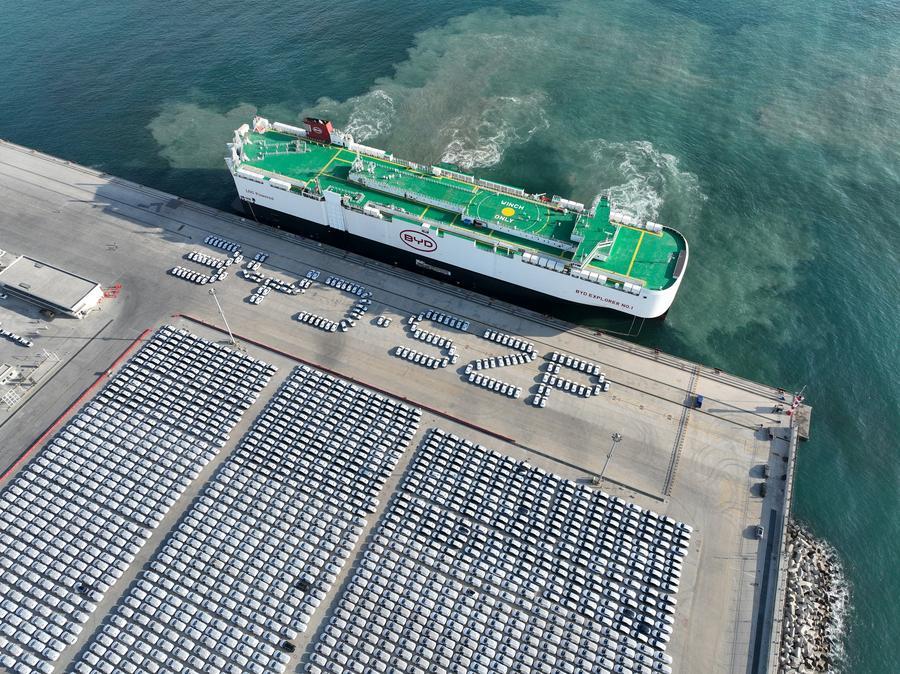
 0 Comment(s)
0 Comment(s) Print
Print E-mail Xinhua, January 23, 2024
E-mail Xinhua, January 23, 2024

Vehicle carrier vessel "BYD EXPLORER NO.1" arrives at Xiaomo International Logistics Port in Shenzhen, south China's Guangdong Province, Jan. 14, 2024. [Photo/Xinhua]
China is briskly fostering new competitive edges from electric cars to e-commerce platforms to stabilize foreign trade this year against the backdrop of a sluggish global economy.
A "ro-ro" (roll-on/roll-off) cargo vessel carrying over 5,000 new energy vehicles embarked on its maiden voyage last week from Shenzhen Port in south China's Guangdong Province. The ship leased to Chinese automaker BYD set sail for the ports of Vlissingen in the Netherlands and Bremerhaven in Germany.
Car exports emerged as a bright spot in China's foreign trade. With 4.91 million vehicles shipped overseas in 2023, the country is expected to become the world's largest auto exporter.
Clothes, furniture and home appliances -- major products from China in the past -- have been replaced by the tech-intensive and green "new three," namely electric passenger vehicles, solar batteries and lithium-ion batteries, which reported a combined export volume of over 1 trillion yuan (about 140 billion U.S. dollars) last year.
"Innovation is especially critical in a saturated global market," said Zhang Wei, vice president of the Chinese Academy of International Trade and Economic Cooperation under the Ministry of Commerce, when commenting on China's changing export structure.
In the face of fierce global competition, Chinese enterprises are accelerating their transition toward intelligent and environmentally friendly practices in hopes of standing out with new technologies and compelling products.
At the 2024 Consumer Electronics Show, which concluded on Jan. 12 in the U.S. city of Las Vegas, Chinese companies launched a series of new tech products, including new-generation TVs, robots, electric vehicles and solar panels.
Computer giant Lenovo unveiled a full lineup of more than 40 new devices and solutions powered by artificial intelligence (AI). Television brand TCL presented the world's largest QD-Mini LED TV. Hisense brought its automobile laser displays, rollable laser TVs, and cutting-edge screen technologies.
Chinese enterprises no longer rely solely on low prices but boast fresh advantages of high technologies, high added value, and high quality, Fang Xueyu, president of Hisense Group's international marketing unit, said.
Apart from tech products, booming e-commerce platforms have also given a boost to China's foreign trade.
In Yiwu, a production hub for small commodities in east China's Zhejiang Province, Guo Xinxin is contemplating the possibility of exploring Mercado Libre, the largest e-commerce platform in Latin America, as a means to expand his business.
Guo works for a trading company and leads a team responsible for selling kitchen utensils and household products on various e-commerce platforms such as Amazon, AliExpress and TEMU. Manufacturers only need to send the goods to the domestic warehouse of the platforms, which handle cross-border logistics, marketing promotion, return and exchange, and even legal affairs.
"Many producers who were engaged only in domestic trade are going overseas through this mode," Guo said.
Some tech-savvy sellers even took advantage of AI to make their products reach more global consumers.
Zhang Jiying, an umbrella vendor in Yiwu, now has a digital assistant capable of promoting products in 36 languages, including English, French and Spanish. This virtual representative can conduct livestream shows 24 hours a day, exhibiting movements and expressions akin to a human being. "She has not only captured the attention of our regular customers but also drawn in new fans," Zhang said.
There are over 4,000 AI-powered virtual livestreamers in Yiwu and experts believe that such burgeoning digital technologies will bring fresh impetus to e-commerce and trade growth.
In 2023, China's cross-border e-commerce imports and exports reached 2.38 trillion yuan, an increase of 15.6 percent from a year ago.
China's trade prospects for this year will also be enhanced, thanks to the country's unwavering commitment to opening up.
Despite gloomy global trade, the country has opened its door wider to the world, with efforts to promote Belt and Road cooperation, improve its pilot free trade zones, and expand the network of free trade agreements (FTAs) with other countries.
In 2023, China's imports and exports with countries participating in Belt and Road cooperation reached 19.47 trillion yuan, accounting for 46.6 percent of China's total foreign trade. The China-Nicaragua FTA, which took effect on Jan. 1, 2024, offered tariff exemptions for about 60 percent of goods in the bilateral trade and the volume will be gradually raised to over 95 percent.
With continued policy support and opening up, China will foster more new trade drivers to ensure stable and quality growth of both imports and exports, Wang Lingjun, deputy head of the General Administration of Customs, said.
Go to Forum >>0 Comment(s)